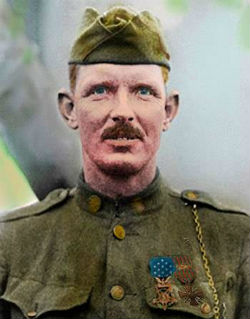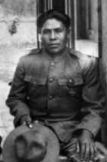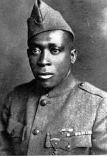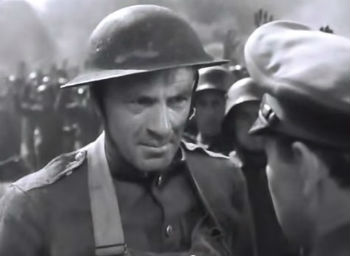 Sgt. Alvin York
Sgt. Alvin YorkBy Neil Earle
 Sgt. Alvin York
Sgt. Alvin YorkThe television news sure is giving us a bellyful of war pictures from Gaza and the Ukraine and the occasional foray into Iraq this summer. What terrible tragedies. And it’s all so ironic because the month of August is the 100th anniversary of World War One beginning. It may be a good time for a quick review of the historical Christian Church’s view of war as strained through the example of World War One’s greatest hero, the Tennessee rifleman Sergeant Alvin York.
Alvin York (1887-1964) is depicted in the famous 1941 movie (starring Gary Cooper) about how a hell-raising turkey farmer from the Tennessee-Kentucky border came to Christ in a revival, ended up teaching Sunday School and later winning the Congressional Medal of Honor. This is all drama enough yet York was confronted with a challenge to the pacifist beliefs of his small mountain sect when America got dragged into World War One in April, 1917.
 Nowadays most textbooks place Sergeant York’s unforgettable
feat alongside that of Private Joseph Oklahombi (1895-1960) (pictured), a
Choctaw Indian from Oklahoma. Joseph’s story is a little
vaguer but apparently he led a small unit of 23 men into a situation
where they were stranded in “No-Man’s land” between
the trenches and turned the enemy’s own artillery against them.
Joseph supposedly took the lead in forcing the surrender of 171
prisoners. He later turned down Hollywood roles depicting his service
and died in a car crash in 1960, modest and a good son to the end.
Nowadays most textbooks place Sergeant York’s unforgettable
feat alongside that of Private Joseph Oklahombi (1895-1960) (pictured), a
Choctaw Indian from Oklahoma. Joseph’s story is a little
vaguer but apparently he led a small unit of 23 men into a situation
where they were stranded in “No-Man’s land” between
the trenches and turned the enemy’s own artillery against them.
Joseph supposedly took the lead in forcing the surrender of 171
prisoners. He later turned down Hollywood roles depicting his service
and died in a car crash in 1960, modest and a good son to the end. While on sentry duty, Sergeant Henry Johnson (pictured), an
African-American with the 369th Infantry Division, earned
the French Croix de Guerre for rescuing a fellow-soldier on
sentry duty from a German patrol with just knife and a rifle. Teddy
Roosevelt admired Johnson’s actions and his case is under
review by the Defence Department. There is already a statue of him at
Albany in New York’s state capital. Apparently he is about to
be awarded the Congressional Medal of Honor, joining 89 other
African-Americans so inducted.
While on sentry duty, Sergeant Henry Johnson (pictured), an
African-American with the 369th Infantry Division, earned
the French Croix de Guerre for rescuing a fellow-soldier on
sentry duty from a German patrol with just knife and a rifle. Teddy
Roosevelt admired Johnson’s actions and his case is under
review by the Defence Department. There is already a statue of him at
Albany in New York’s state capital. Apparently he is about to
be awarded the Congressional Medal of Honor, joining 89 other
African-Americans so inducted.York’s terrible affliction of conscience is brought out in the movie. Colonel Doug Mastriano of the US Army (RET) retells the story in a YouTube clip. Mastriano praises York’s superiors, two devout Christians, for being so patient and understanding to hear out York’s objections. Major Buxton and Captain Danforth knew the ethical dilemmas well, which we can illustrate here below.
Basically the Christian church has evolved three positions since the days of St. Augustine who first systematized the dilemma facing the Church:
1. ACTIVISM. This is the mainstream view. Christians are allowed to support a military effort whenever their country declares war. See Romans 13:1-7 and 1 Peter 2:13-14. Since rulers and officials are called ministers of God we are obliged to submit to state decisions. There are numerous Old Testament arguments – Holy War against Amalek, etc. (Exodus 17:8-16; Joshua 6:20-21).
Activists argue that God is more concerned about justice than “peace at all costs.” Martin Luther stressed the “Two Kingdoms” – God and Man. Luther felt it was unreasonable to expect Christians to live utopian lives in this world – even the Sermon on the Mount gave realistic instruction on going to court, submitting to imperfect civil powers, etc. (Matthew 5:25-26). Thus Christian need have no qualms supporting the state in times of war.
2. PACIFISM, etc. – total abstinence from combat. Conscientious objectors (COs) fit in here. Even some pacifists allow noncombatant activities such as the medical corps. In WW1, COs suffered greatly for their beliefs and some were killed. This is the heights of injustice. Alvin York knew the pacifist texts very well. Pacifists argue that Jesus was non-violent. He rejected the sword in Matthew 26:52. He said his servants would not bring in his kingdom by force (John 18:36). He taught to not resist evil (Matthew 5:38-48) and stressed love for all people (Luke 10:29-37). He inspired Paul to write that final vengeance must be left to God (Romans 12:9). Well said because war is so terrible that it leaves gaping wounds of unresolved feelings of vengeance in its wake. That will be true of the conflicts marching across our screens this summer.
Closely linked here is Passive Non-Resistance. Jesus and Paul protested civil rights violations against their persons (Mat. 26:51-55; John 18:19-24; Acts 25:11). Jesus was not neutral. He even “caused trouble” on occasion, as in cleansing the temple or defying the village elders (Mark 3:1-6). He submitted to arrest, but protested unjust treatment (John 18:23). Another aspect here is Civil Disobedience. A Christian minister, the Reverend Martin Luther King comes to mind. Also the Hebrew midwives in Exodus 1:15-22 – they forthrightly refused to carry out state genocide. The early apostles gave Christians in brutal dictatorships a striking credo that balances out Activism – “we ought to obey God rather than men “(Acts 5:29). In Acts we often see convicted Christians standing against the constituted authority and willing to bear the consequences (Acts 5:41-42).
Jesus was in that mode when he pardoned the adulterous woman taken in the very act of adultery or teaching the Parable of the Persistent Widow vs. the Unjust Judge (Luke 18:1-8).
Do we have any unjust judges these days? Jesus himself ignored rules that were silly or harmful or in violation of a higher principle (Matthew 12:1-8). Thus, the Peace Churches help us rethink Activism.
3. JUST WAR or SELECTIVISM. This is almost a mediating position. Romans 13:1-8 is used again. Say Just War advocates: Christians were right to defend Christian values against the Nazis. But Just War advocates are selective in their application. The WW2 criterion might not apply to the Vietnam War (1965-73), for example. The early actions in Afghanistan in 2002 may be different than the actual invasion of Iraq the next year. The clear pre-conditions in Just War theory are these:
Just Cause with Just Intentions/Just Means – e.g. no poison gas, etc./ Recognized Authority declares war/ Success can be expected fairly quickly/ Lethal violence as the last resort/Civilians or neutrals given fair warning/There must be Proportionality of Response/Good results rather than evil consequences expected.
 Gary Cooper starred as "Sergeant York" in the 1941 movie.
Gary Cooper starred as "Sergeant York" in the 1941 movie.You can tell from some of these pre-conditions that Just War advocates have had an impact. “Gas attacks” are something reprehensible to the world community even after all combatants had used it in WW1.
Corporal Alvin York wrestled with all these arguments back and forth. He knew his Bible well. In the end he was convinced by Ezekiel 33 which he interpreted as taking responsibility for the shedding of innocent blood: saving your buddies. In an incredibly daring action, York charged 25 machine gun nests and saved the lives of not only his buddies but the 132 Germans he led in capturing. He was a dead shot and Colonel Mastriano’s researches has cemented his startling legend. York himself gave all the glory to God. Publically and repeatedly. “By their fruits you shall know them” (Matthew 7:20).
In the end the Biblical evidence for going to war can be argued both ways. Or three or four. It seems like this is a case where the Holy Spirit leaves it to all of us as a matter of Christian conscience. It comes under the category of Christian Ethics and any seminary graduate will tell you this is not an easy course. York was true to his Christian convictions till the bitter end – he “walked the walk.” He used his fame to build an agricultural school and Alvin York Institute is still there in Jamestown, Tennessee serving 800 students. What a blessing. He only approved the 1941 movie to raise funds for a Bible school.
Romans 12:18 is a biblical call to fervent peacemaking – “as much as lies in you be at peace with all men.” Overall, on war the Holy Spirit seems to be allowing us room to maneuver, always cautioning “be swift to hear, slow to speak, slow to wrath” (James 1:19) and urging us to be quick to take the side of peace. So much history, so many lessons. Alvin York’s life shows one person – one devoted Christian – can make a difference and that we are not hopeless driftwood floating on the seemingly overpowering tides of life. Thanks be to God.